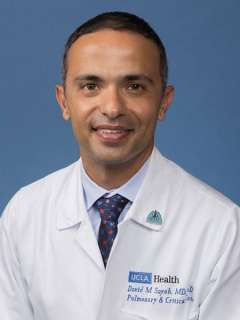It's the only transplant center in Los Angeles County to receive 5-tier rating.
UCLA Health is among the highest tier of transplant centers nationwide for outstanding patient outcomes, according to the Scientific Registry of Transplant Recipients.
The ranking is based on how quickly patients receive transplants and the one-year survival rates for patients with transplanted organs. UCLA Health is the only lung transplant program in Los Angeles to receive top-tier recognition in the critical metric of patient survival.
Patients seeking lung transplants at UCLA Health received organs quicker than the national average and had nearly a 92% survival rate one year after transplant surgery, according to the semi-annual ranking released in January.
UC San Francisco and UC San Diego were among other medical centers to achieved SRTR’s top-tier rating. UCLA Health, however, performs more transplants, says David Sayah, MD, PhD, medical director of UCLA Health’s lung transplant program.
“We have a large-volume program and we take on high-risk, complex recipients, which makes having this kind of designation more uncommon,” Dr. Sayah says.
The UCLA Lung Transplant program has a long tradition of excellence in clinical outcomes and innovations. It pioneered lung transplantation in patients who also have heart diseases and has vast experience in repairing heart conditions along with lung transplantation with favorable outcomes.
UCLA also is one of the few programs to show that lung transplantation can be safely performed in patients with systemic sclerosis.
What makes the five-tier rating even more significant is that UCLA Health receives transplant patients with complex conditions who have been rejected by other medical centers.
UCLA’s Lung Transplant Program is a referral center for many patients deemed high risk at busy lung transplant programs. Many critically ill patients on ECMO (extracorporeal membrane oxygenation), or high-surgical-risk patients are air-lifted to UCLA from lung transplant programs in the Midwest for high-risk lung transplantation.
The success of the UCLA Lung Transplant program in taking these high-risk patients can be attributed to the expertise of the UCLA team, the availability of resources and a commitment to taking care of patients who have no other options.
“We get patients referred from other programs where they can’t do the transplant and they come to us,” Dr. Sayah says. “I can’t think of a case where we didn’t transplant someone because they were too high risk and another program did. So the fact that we’re able to achieve these kinds of outcomes in that setting, I think that’s almost the more remarkable part.”

Patients might be rejected from other centers because of the complexity of their conditions or underlying medical problems that contribute to high surgical risk, he says. Some patients who receive transplants at UCLA Health require concurrent cardiac surgery, suffer from scleroderma or need extracorporeal membrane oxygenation (ECMO) treatment before transplantation.
“We’re particularly happy that we’ve been able to accomplish this ranking without compromising on our mission, which is to provide transplants for as many people as we safely can,” Dr. Sayah says.
What allows UCLA Health to perform so many complicated lung transplants with such success is an excellent interdisciplinary team, Dr. Sayah says. The UCLA Health lung transplant program performed 91 lung transplants in the fiscal year ending in June 2021 and more than 1,400 procedures to date.
“It boils down to experience and that comes from having that larger volume,” Dr. Sayah says. “If you’re only doing 20 to 30 transplants a year, you don’t get to that level of expertise — of seeing the rare complications and the challenging cases in patients that come through and do well. I think it’s a combination of experience, and also having really expert people on our team.”
The publicly available SRTR report allows people who need a lung transplant to make informed decisions about where to get their care, Dr. Sayah says: “Be empowered and do your research.”
Learn more about the UCLA Health Lung Transplant program at UCLA Health.




